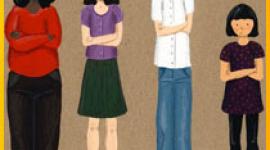Eating Disorders in Men
 "Many men feel shy or awkward about seeking outside help, and therefore do not get the professional treatment they need when they suffer of eating disorders. But there are numerous medical and emotional side effects of eating disorders, and only experienced professionals have the tools to help. If you have an eating disorder, unless you are the kind of guy who builds his own house, performs dental procedures on himself, and is his own lawyer, you need to get professional guidance!" It is important to understand that even if the individual does not meet all the diagnostic criteria they may indeed still be in severe pain and should seek treatment before things become worse as they often do.
"Many men feel shy or awkward about seeking outside help, and therefore do not get the professional treatment they need when they suffer of eating disorders. But there are numerous medical and emotional side effects of eating disorders, and only experienced professionals have the tools to help. If you have an eating disorder, unless you are the kind of guy who builds his own house, performs dental procedures on himself, and is his own lawyer, you need to get professional guidance!" It is important to understand that even if the individual does not meet all the diagnostic criteria they may indeed still be in severe pain and should seek treatment before things become worse as they often do.
Statistically speaking, those who seek early treatment for their eating disorder will progress through recovery more quickly than those who waited years before seeking help. When the behaviors and critical thinking have been ingrained over a significant period of time, it will take longer for the individual to disengage from their disorder. In these cases, longer orTreatment Options for Eating Disorders Nutrition Intervention in the Treatment of Anorexia Nervosa, Bulimi more intensive treatment is needed.
"For most men and women who suffer, their eating disorder represents an impaired sense of self. Without effective treatment, they are unable to establish a healthy inner dialogue. What makes eating disorders difficult to overcome without professional help is the insidious way they progressively damage an already-impaired self. They ultimately become the person's identity, rather than merely an illness the person experiences. In addition, habit patterns, altered physiology, and probably neurochemical changes further lock in the disorder."
Therapy
Therapy for eating disorders provides safe and validating connections with people who know how to care for that hurt self and who understand the complexity of the illness. For men, the therapist needs to understand not only what it is like to be a person with an eating disorder, but also what it is like to be a man with an eating disorder. Although it seems obvious, the therapist needs to have genuine respect for the patient and appreciate the degree of shame that he might have simply from being a man who has what has traditionally been viewed as a "woman's problem."
Medical Management
Medical management by a physician is highly recommended. It is important to go to someone who can be understanding and compassionate allowing the man to be able to feel free enough to be honest about the eating disorder. A complete physical is recommended including appropriate blood work studies.
Nutritional Counseling
The dietitian has an important role in the man's recovery process from an eating disorder. To treat the anoretic, the dietitian has to loosen the hold on restrictive eating in a very reassuring manner. Sensitivity to the man's fears of becoming "fat" are imperative. For the bulimic or binge-eater, the dietitian must help the man normalize food consumption. It is important to keep in mind that no single meal plan works for everyone, so the dietitian must establish one that is individualized for the particular individual. Often the dietitian helps enable the person to incorporate new challenges to assist him in overcoming fears of portions, increased variety and specific foods. The focus mRole Relationships ust be removed from calories and fat grams substituting a healthy more balanced approach to meals.
Treatment for Men
Although the vast majority of issues related to eating disorders are common to men and women, there are issues unique to men, such as the shame they feel for suffering with what was formally known as a "woman's" illness, hormone changes, gender roles, and male body image. Ideally treatment for men should include segregated programs allowing them to work on gender-specific issues. They can express their masculine emotions with others who can relate. Additionally they can be monitored for hormonal needs and focus on male body image.
There are a variety of treatment options available but not all are segregated:
- Outpatient treatment suffices for most people entering treatment and in less severe cases
- Day hospital programs offer a flexible, though structured, treatment setting during the daytime.
- Inpatient hospital programs are geared to stabilize medically-compromised patients.
- Residential treatment at treatment centers for eating disorders is specifically designed for patients with severe cases, or who have been unsuccessful with the other levels of treatment. (At this time only Rogers Memorial Hospital, in Oconomowoc, Wisconsin offers a residential program specifically designed for men)
- There are relatively few programs available specifically for men. Some partial programs exist.
- St. Anthony's Medical Center in St. Louis provides specialized out-patient groups for men's eating disorders.
- It is important to understand what you may face with respect to insurance companies
How Can Loved Ones Help
"Regardless of the nature of your relationship, or his problems, you are vital to his healing process, and will ultimately benefit from his feeling better about himself. Keep in mind how difficult it must be living with the "stigma" of having a "woman's disease". Men have been suffering in the silence of a "macho" culture of denial, shame, and secrecy."
Men are typically silent about what bothers them, or they may not even be able to articulate their feelings or thoughts. However, when obsessions are serious, they are signs of deep emotional pain--people who focus on their looks often do so to avoid or compensate for internal issues.
"Given the complexity of men's problems, it stands to reason that the recovery process takes time and effort. Once he gets past denial, you can help him sort out his situation and make a plan. Let him do the talking. Ask questions, be a good listener, interject observations once in a while, but mainly listen."
next: Eating Disorders in Men and Boys
~ eating disorders library
~ all articles on eating disorders
APA Reference
Gluck, S.
(2008, December 21). Eating Disorders in Men, HealthyPlace. Retrieved
on 2026, January 12 from https://www.healthyplace.com/eating-disorders/articles/eating-disorders-in-men



